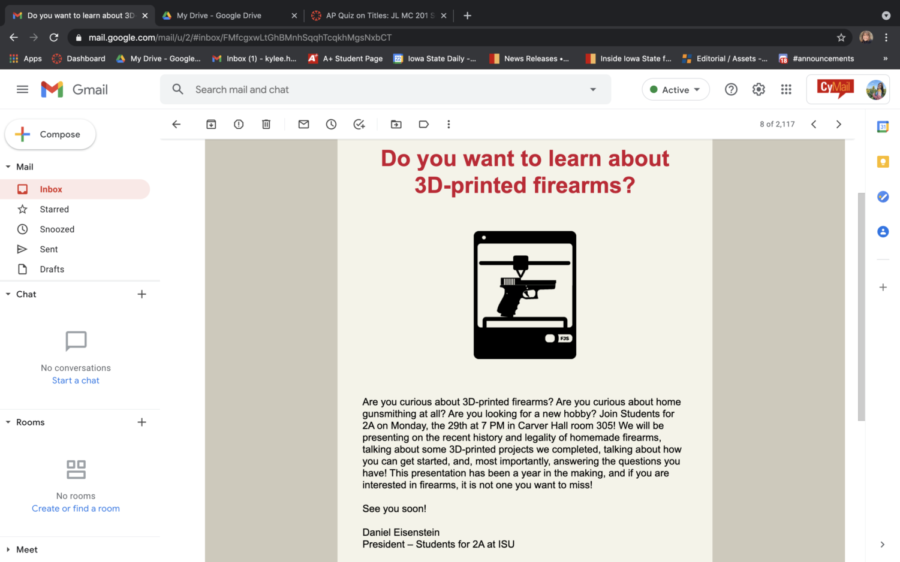Letter: The dangers of ghost guns
April 1, 2021
Less than 24 hours after a mass shooting that killed 10 people in Boulder, Colorado, every student at Iowa State received an email advertising an upcoming meeting about 3D printed firearms for the student organization Students for 2A.
As students, we were shocked to see a GIF of a firearm along with the invitation to discuss “how you can get started” making your own 3D-printed guns. Students received this message only a week after a man in Atlanta shot and killed eight people, six of whom were women of Asian descent, and less than a day after another mass shooting. Not only was the timing of this email incredibly insensitive, but the content instilled fear in students, especially those who identify as students of color. We are angered and disappointed that the university and the Students for 2A organization did not delay the release of this university-wide email.
“If we consider delaying or canceling our presentations, we would fail to meet the goals of our organization, including our ability to have open and honest discussions with those who vehemently disagree with us,” read the statement from the Students for 2A organization published in the Iowa State Daily.
We are appalled by this statement suggesting that mass shootings involving the murders of innocent Americans are not important enough to reschedule a student presentation to prevent the retraumatization and incitement of fear within countless students.
Ghost guns — 3D-printed firearms created at home without a license or serial number — are America’s fastest-growing gun safety problem. The email sent out to students referred to the creation of downloadable guns as a “new hobby.” Ghost guns are not a harmless hobby. The technique of creating unlicensed, untraceable firearms allows violent criminals, domestic abusers, gun traffickers and anyone else in the U.S. create a firearm frame with ease and without a background check. Nearly 2,500 ghost guns were connected to criminal activity in 102 federal cases over the past decade, according to a report by Everytown for Gun Safety. Many of these guns were assault-style or machine guns. Additionally, 3D-printed guns made of plastic are undetectable by metal detectors.
Under the current interpretation of federal law by the Bureau of Alcohol, Tobacco, Firearms and Explosives (ATF), the unregulated sale of “unfinished” gun-building blocks that can become a fully functioning weapon in less than an hour is legal. We call on the ATF to clarify its regulations regarding “unfinished” firearms and subject these untraceable guns to the same regulations as legally manufactured guns. We also call on President Joe Biden to take executive action. Let’s be clear: the code and 3D printer required to create an unserialized and untraceable downloadable gun does not require a background check. According to a recent Quinnipiac University poll, 93 percent of American voters support common-sense background checks that keep guns out of the wrong hands, including 87 percent of gun owners — a measure the Iowa Legislature has acted to rescind.
We must make the dangers of ghost guns known. The ATF must change the definition of “firearm frames and receivers” to allow regulation that keeps our families and nation safe. If the ATF fails to act, we call on Congress to pass a new law clarifying its intent, and we call on states to stop the buying and selling of ghost guns.
Abigail Garlock is the vice president of Students Demand Action and a freshman in child, adult and family services at Iowa State. Grace Johnson is the president of Students Demand Action and a senior in public relations at Iowa State.







